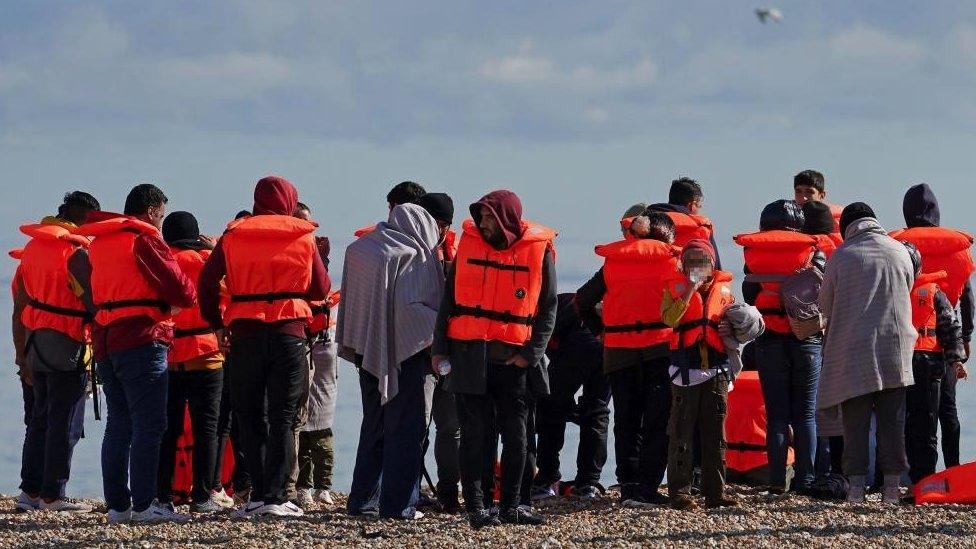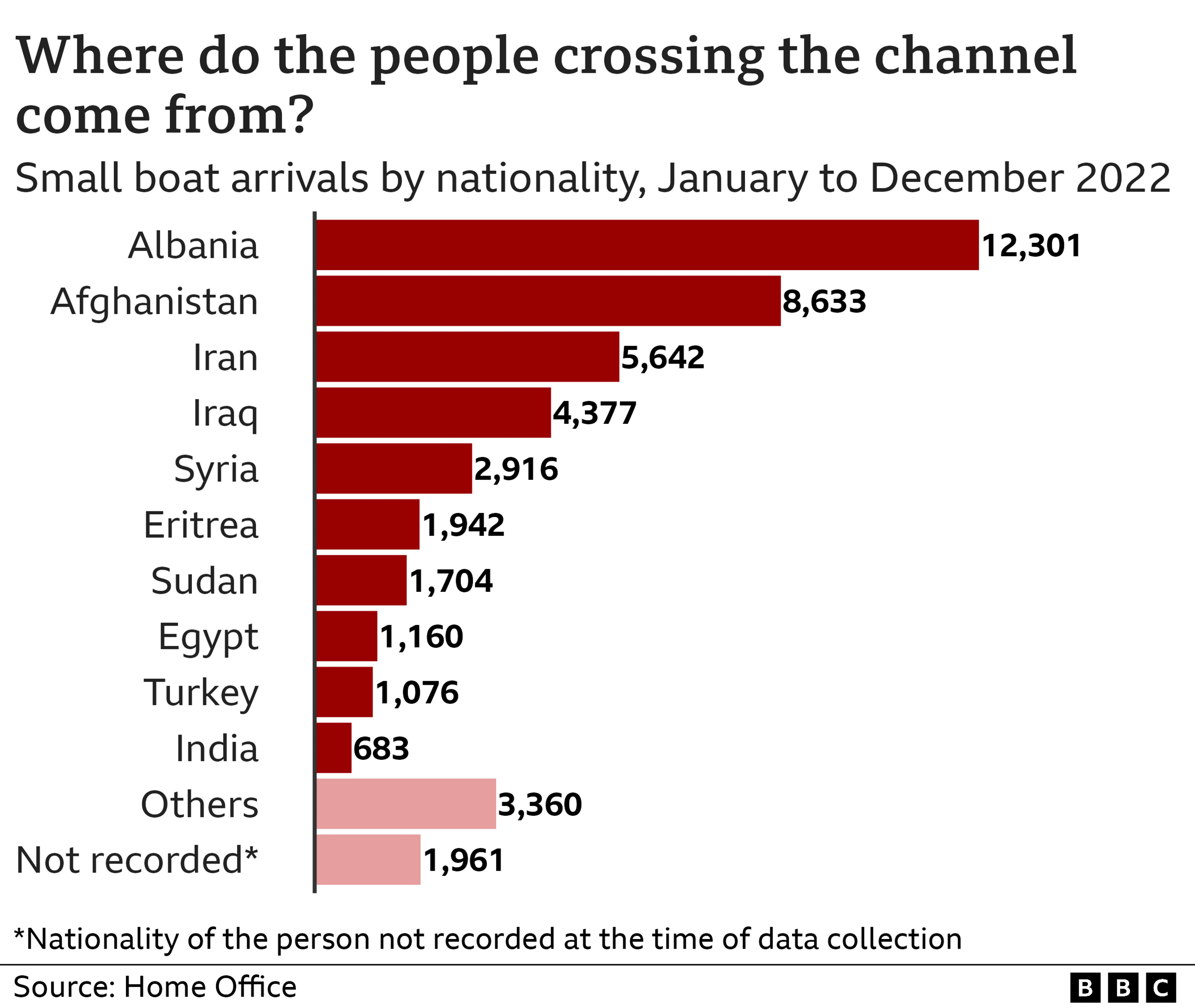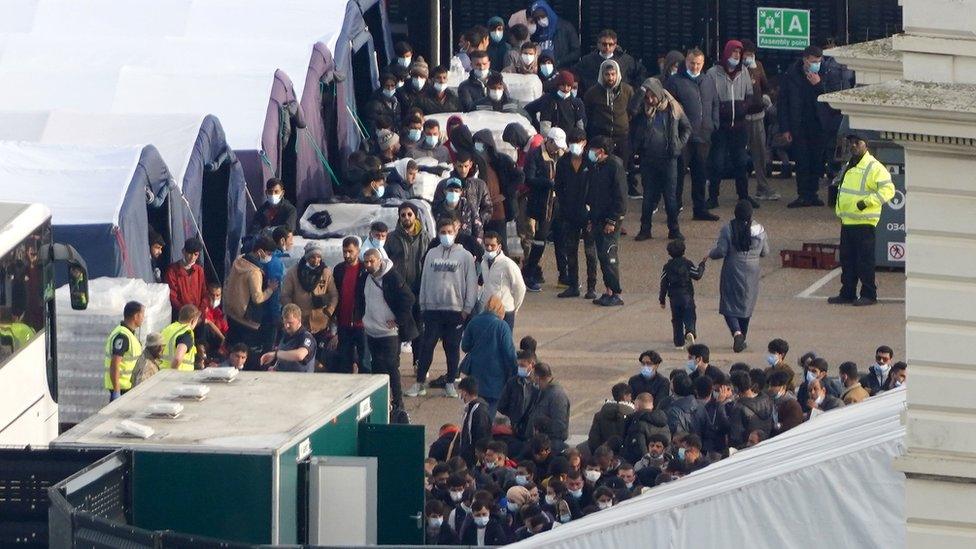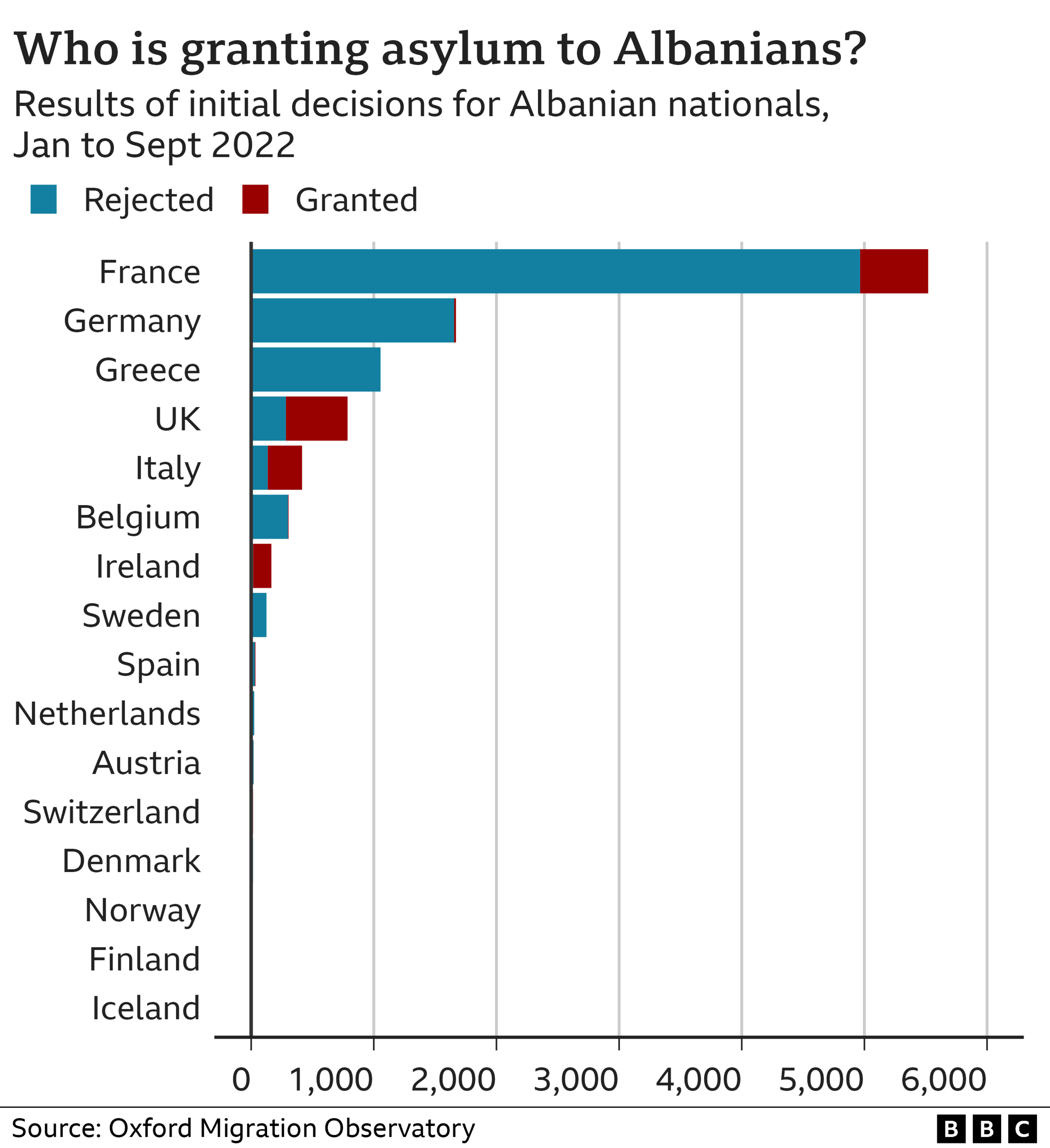Albanian migrants: Why are they coming to the UK and how many have arrived?
- Published

The government says its deal with Albania in December has reduced the number of Albanian migrants arriving in small boats.
"I've also negotiated a new deal with Albania, which accounted for a third of all small boats arrivals, and that's already delivering," Prime Minister Rishi Sunak said at a news conference on 7 March.
"We've returned 500 illegal migrants to Albania and we are seeing far fewer come as a result."
In 2022, more people arrived in small boats from Albania - which Mr Sunak has called a "safe, prosperous European country" - than from any other country.
How many Albanian migrants come to the UK?
There has been a rapid increase in the number of Albanian migrants, external crossing the English Channel:
In 2020, 50 arrived on small boats
In 2021, 800 made the crossing
In 2022, 12,301 arrived
The figure for 2022 accounted for 28% of arrivals in small boats, which is somewhat less than the one third suggested by the prime minister.
Many are single, adult men - the numbers represent around 1% of Albania's working age men, according to figures from Eurostat.
"The rise has been exponential and we think that is in the main due to the fact that Albanian criminal gangs have gained a foothold in the north of France," Clandestine Channel Threat Commander Dan O'Mahoney told the Home Affairs Select Committee.

Has the number arriving been falling?
Of the Albanian migrants who arrived in small boats in 2022, 95% arrived between May and October.
The numbers were much lower in November, when 166 arrived and December, when 28 arrived.
But that significant fall cannot be entirely due to the cooperation agreement, external between the UK and Albania because it was not signed until 13 December.
No figures for arrivals broken down by nationality have yet been published for 2023. We have asked the Home Office for the figures to support the prime minister's claim but were told they would not be available until they are published in May.
How many Albanians does the UK return?
In the 12 months to end of September 2022, a total of 900 Albanians were removed from the UK, external, with another 469 returning voluntarily. Those are the most recent figures that have been published.
Albanians represented the highest number of foreign offenders sent back in the year to September 2022.
The Home Office says that since the announcement on 13 December, more than 500 illegal migrants have been returned to Albania, but those figures will not be published until August.
More than 500 enforced removals in just under three months would be a lot. We haven't seen anything close to that for a single quarter since the 461 removals between October and December 2016, although of course there has been an unusually large number of arrivals in the past year.
We also know that on 12 January 2023, the UK deported 43 people to Albania - 27 of whom had committed criminal offences according to the Home Office.
The cooperation agreement signed, external with Albania in December:
Set up a joint task force to deter and disrupt illegal migration
The UK agreed to assist with services to support those returning to Albania
The countries will share information to reduce illegal migration and combat human trafficking
Mr Sunak also announced he wanted to increase the numbers returned to Albania by:
Setting up a new unit staffed by 400 specialists to process Albanian cases
Raising the threshold someone has to meet to be considered a victim of "modern slavery"
New guidance for case workers that Albania is a "safe country"
Sending UK border officials to the airport in Tirana, the capital of Albania

Migrants crossing the Channel on small boats brought ashore at Dover
How many Albanian migrants are granted asylum?
In 2022, 85% of Albanians who arrived by small boats submitted asylum applications.
Only 68 of them (0.7%) have received an initial decision, external and none were granted refugee status or another type of leave to remain.
In general, 53% of claims by Albanians, external are accepted. Most are by women and children.
The National Crime Agency (NCA) has said some Albanian migrants falsely claim to be victims of trafficking, using standard letters to apply for help.
In 2022, 13% of Albanians - 1,719 people - who arrived in small boats were referred to the National Referral Mechanism for modern slavery. That's a higher number than for any other country.
Other Albanian migrants disappear and work illegally in the UK, before returning home, according to Mr O'Mahoney.
Albanians can apply to enter the UK, external with a visa for tourism, business or study.
In 2022, the UK received 31,965 visitor visa applications from Albanian citizens and granted 22,359 of them, according to Home Office figures, external.
How does the UK compare with the rest of Europe?
In the first nine months of 2022, France processed more asylum applications from Albanians than the UK but rejected most of them.

Germany and Greece were next, followed by the UK, which granted asylum at a significantly higher rate than the others except for the Republic of Ireland.
One migration expert pointed out, external that some countries have been faster at making asylum decisions than the UK, pointing out: "in Q3 [July to September 2022] this year, France made over 31,000 initial decisions. That's the same total as the last 7 quarters in the UK."
EU countries appear to have been finding it difficult , externalto return unsuccessful asylum-seekers to their countries of origin, although there are no comparable statistics for this.
What makes migrants leave Albania?
On 7 December 2022, Qirjako Qirko - the Albanian ambassador to the UK - told MPs that some Albanian migrants come to the UK to seek out business opportunities. He also claimed that some "pretended" to be victims of modern slavery.
Speaking before the same committee, Balkans expert Andi Hoxhaj estimated that around 40% of people leave Albania for "economic opportunities".
Three decades after the collapse of Enver Hoxha's dictatorship and the opening of Albania's borders, about 60% of the country's adult population wanted to leave, according to a Gallup poll, external published in December 2018.
They cited corruption, low salaries, poor working conditions and a low quality of life as their main reasons.